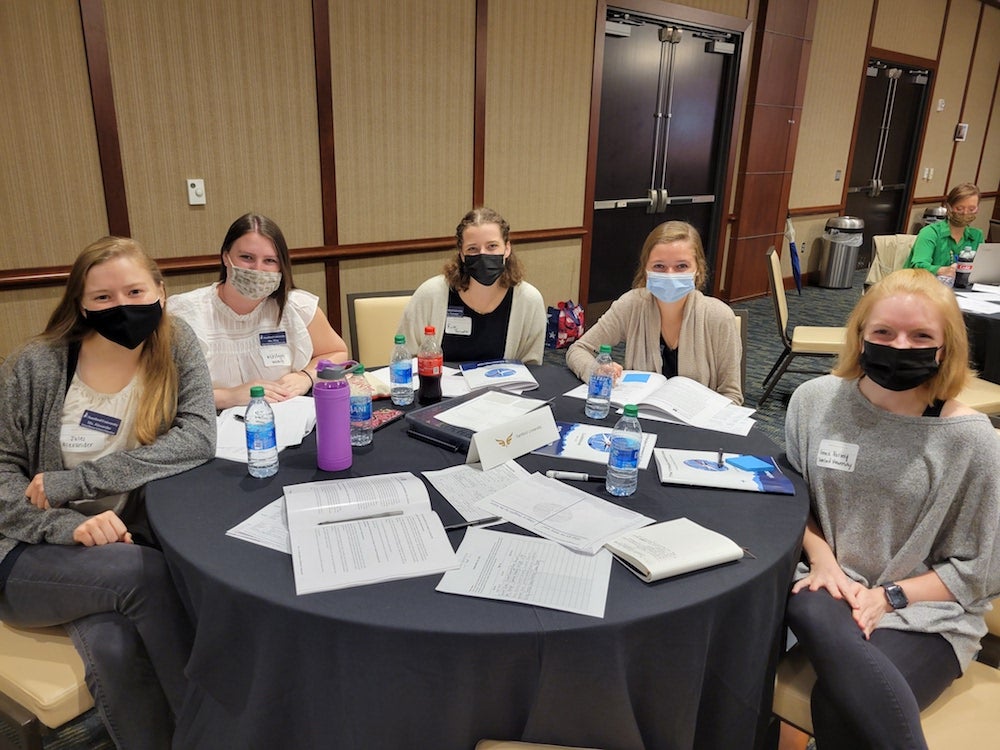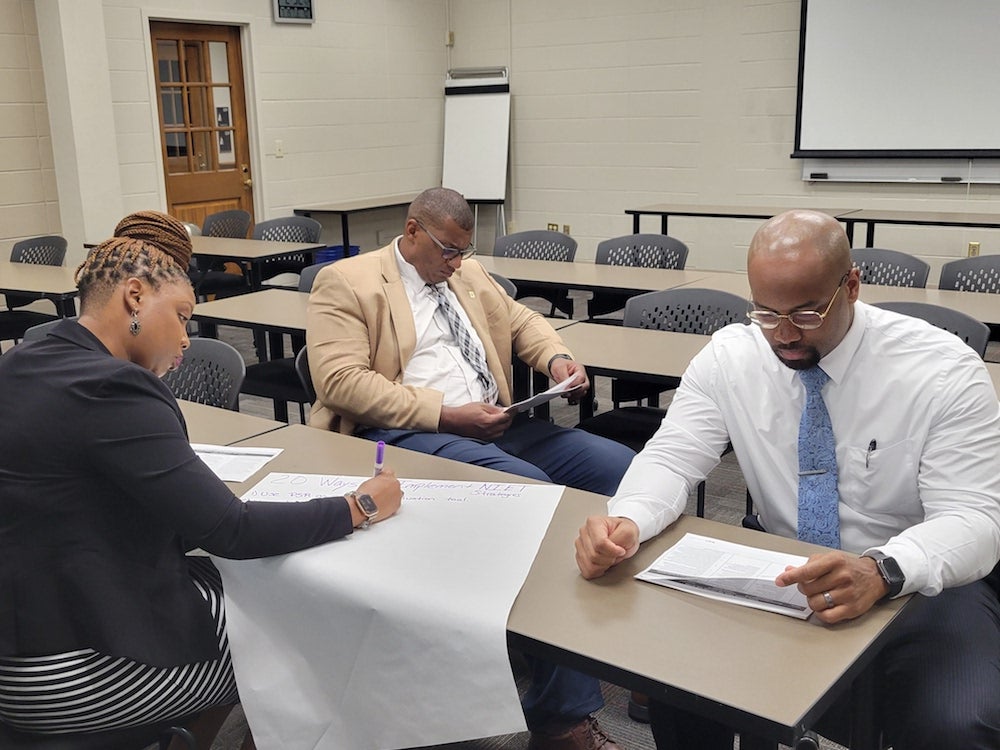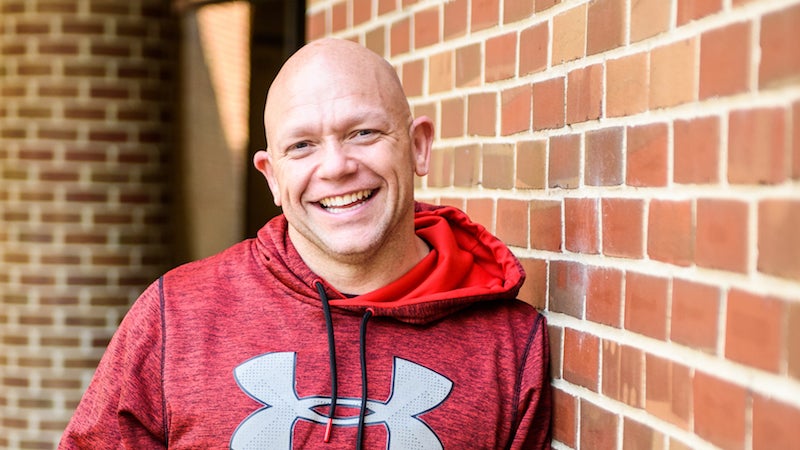By Carmen Brown
Photos contributed
Homewood schools have long held a reputation for excellence. With its mission “to educate and empower all students to maximize their unique potential,” Homewood schools have consistently ranked as some of the top schools in the entire nation and in the state.
Continuously raising the bar, this year marks the beginning of a new united purpose designed to have far-reaching effects in the Homewood community.
This is the first year all five schools in the Homewood City School System—Shades Cahaba Elementary, Edgewood Elementary, Hall-Kent Elementary, Homewood Middle School and Homewood High School– will be implementing character-building skills into the daily lives of their students through a new partnership with Hope Leadership Academy’s Character Education Program.
The Hope Leadership Academy is a cutting-edge, three-year educational training and enrichment program where leaders from Alabama schools gather to learn the latest research and strategies on instilling positive character traits in their young students. The curriculum was developed by Kara Chism, assistant professor of educational leadership at Samford. Over the three-year period, participants from schools across the state receive professional development, book studies, site visits and onsite consulting. They can also learn how their schools can apply to be named a National School of Character, an award given by the Character Education Partnership in Washington, D.C., and honors schools that promote good character through academic achievement, student behavior and school climate.

The Hope Leadership Academy is part of The Hope Institute, which is an independent nonprofit organization housed at Samford University’s Orlean Beeson School of Education. The Hope Institute was founded in 2016 by local attorney and child advocate Liz Huntley and Drayton Nabers Jr., former CEO of Protective Life Corporation and Chief Justice of the Alabama Supreme Court.
Homewood City Schools Director of Academic Programs and Services, John Lowry, says Homewood Schools have a history of working with the Hope Institute.
“Last year, Homewood High School sent a team to the Hope Leadership Academy to help enhance the programs in place that support the school’s values,” John says. “This year we are excited to have all of our schools partnering with their Character Education Program.”The Hope Leadership Academy uses several sources as the framework for training educators: the Building Blocks of Character by the University of Birmingham’s Jubilee Centre in Birmingham, England; Character.org’s Eleven Principles of Character Education and the book “PRIMED for Character Education: Six Design Principles for School Improvement” by Marvin Berkowitz. The six principles are Priority, Relationship Building, Intrinsic Motivation, Modeling Goodness, Empowering Students and Developmental Pedagogy.
Dr. Jodi Newton, professor of educational leadership at Samford University and executive director of the Hope Leadership Academy, says the Character Education Program started five years ago with a vision of every child having a flourishing life of good character. She says approximately 25 teams from across the state attend the annual Hope Leadership Academy training sessions. Since 2017, 101 schools have participated in character education training. All of the teams are assigned facilitators, who are recently retired educators who have already led character education in their schools.
“The teams consist of one administrator, and the rest can be whatever they choose–counselors, coaches, teachers,” Jodi says. “We don’t have students attend the training conferences, but the schools do have student meetings.”
Jodi says the purpose of the Leadership Academy training conference is not to sell a product, although some schools do use specific programs like the Chic-fil-A Leader Academy, where students go to monthly Leader Labs to learn about servant leadership in their communities.

“We’re more about working with the schools and working with the community. The most important element is establishing a caring community where adults serve as role models for students,” she says. “The question we ask them is, ‘What do you want your school to look like?’ The schools tell us what we need, and we help them with that.”
Homewood High School Assistant Principal for Instruction Mindy McBride says the Homewood High School faculty and staff work to create a culture of kindness, respect and the Six Attributes of the Homewood Way:
- Respect yourself, others, and the environment.
- Make good choices, even when no one is watching.
- Celebrate uniqueness, everyone is different.
- Words matter, think before you speak.
- Seek ways to serve others.
- Be your personal best in all you do.
“The Hope Leadership Academy has helped us look at how we infuse character education into the classroom. As we learned at the Hope Institute, we aren’t putting something extra on the plate, instead we are making it the plate,” Mindy says. “We want our students to master our academic learning targets, but we also want our students to learn valuable life skills such as kindness and empathy. We have found ways to incorporate this in everything we do in the classrooms of Homewood High School.”
Mindy says that during the school’s morning announcements, Principal Joel Henneke or an SGA officer reminds the student body of the Six Attributes of the Homewood Way.
“Posters of the Homewood Way can be found throughout the hallways and classrooms of the high school, and students often will remind one another if an action does not reflect the Homewood Way,” Mindy says.
Last year, a team of teachers created videos to show students examples of each attribute and how they can model them at school every day. In the videos, students, teachers and club sponsors presented ideas about how each person at Homewood High School can embody the six attributes. This year, Homewood High School will utilize more frequent study talks, during which grade levels meet with school leaders during their study time. These talks will allow for more interactive discussion between students and administrators.
“The goal is to continue building a school culture that emphasizes kindness, empathy and the common values expressed in the Homewood Way,” Mindy says. “In the first study talk of the year, students were reminded of behavioral and academic expectations and were encouraged to be their best selves in all they do. Future study talks will include topics such as advocating for yourself, respecting the viewpoints of others and using social media in a positive and responsible manner.”

Reba Hudson, Homewood Middle School assistant principal for instruction, says the school is also working with all of its stakeholders to identify the school’s core values.
“Throughout the year, faculty and staff members, students and parents will get to participate in different activities to help identify what HMS means to each group and what they hope HMS means to everyone in the future,” Reba says. “Once these activities are completed by all of our stakeholders, HMS will select the school’s core values.”
Reba says this year Homewood Middle School students will also be able to sign up for a school club hosted by a faculty and staff member. Once a month the clubs will meet during the school day to engage in activities that they are interested in while building and strengthening their leadership skills within their club.
Jodi says one Homewood elementary school had already received accolades for teaching character skills years before the Character Education Program began. Shades Cahaba Elementary was named the first National School of Character in Alabama in 2006 and again in 2012 out of only 24 schools nationwide (it was also the only school in Alabama to receive the award that year).
Now, John says all Homewood elementary schools are participating in “Nest Groups” or the “House System,” in which students, faculty and staff divide into groups to find ways to build a culture of character and community at their school.
“The students, teachers and staff remain in the same house/nest for their entire time at that elementary school to promote student and faculty relationships that will follow them throughout their days at the elementary school,” John says. “The house and nest groups frequently participate in activities to show kindness to their classmates and community through various projects throughout the year.”

The purpose of all of these programs is to allow every student to form positive relationships with faculty or staff members outside the classroom. It also provides a safe and structured environment for this to take place.
John says he looks forward to seeing how the Hope Leadership Academy will continue to support and enhance Homewood City Schools’ “culture of character development,” so students will have the knowledge and tools they need to become strong leaders in the future.
“The research validates that what we’re doing is working, that we’re on track with the training and support we’ve provided schools, administrators and teachers,” Kara says. “It shows that it’s needed, and it’s something that can really make a difference in schools.”
Jodi says she is looking forward to seeing the far-reaching impact this program is going to have on Homewood’s students and the surrounding community in the next few years.
“I don’t think we ever envisioned doing what we’re doing now,” she adds. “People are really hungry for this.”

A Lifelong Impact
Homewood Life recognizes the life of Dr. Jodi Newton, who passed away on Sunday, Sept. 4, as one dedicated to enriching and empowering student’s’ lives. After 36 years as an educator, 10 years as the superintendent to Homewood City Schools and 14 years as a Samford faculty member, Jodi was called home to Heaven, but not before she made the lives of all who knew her better.
Jodi believed in students and their ability to accomplish anything. She was known to instill in students a courage bound by hope and a fervent belief that good character paves the way for success. In 2020, Jodi and her husband, Bob, founded the Bob and Jodi Newton Endowment for Character Education, which funds resources for character education initiatives practiced by students and teachers within the Orlean Beeson School of Education. Because of their efforts, hundreds have gone on to better their school systems by living out the principles that were first taught to them. Because she believed, her students believed in themselves, too, and have gone on to teach other students the same.
Jodi’s legacy will carry on the in hearts of rising educators everywhere. Our hearts go out to her loved ones as her life, though gone too soon, impacted far more than we can ever imagine.










